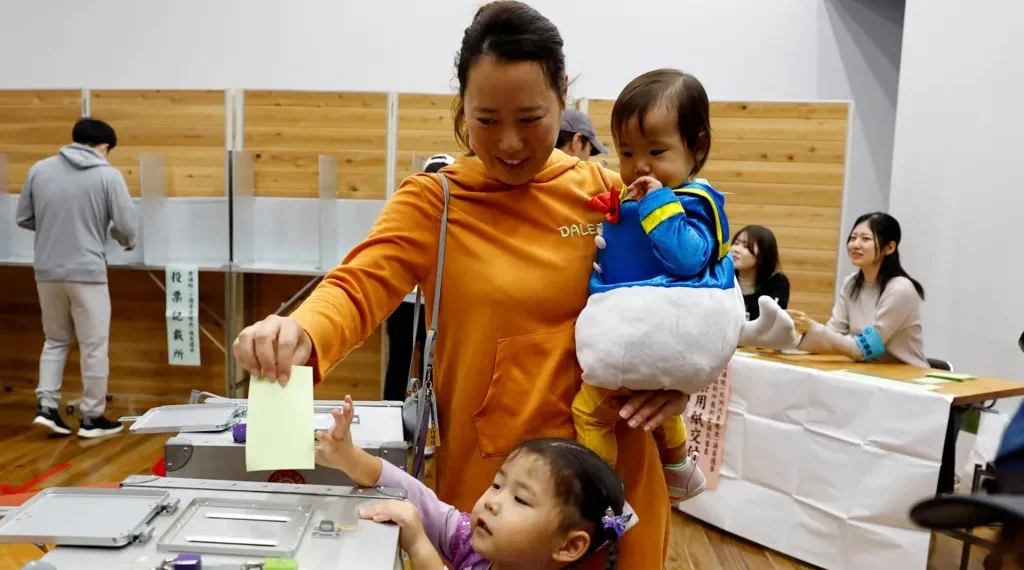Elections Highlight Voter Frustration in Japan
Today, Japanese voters are casting their ballots in a snap election, following a tumultuous period for the ruling Liberal Democratic Party (LDP), marked by a series of scandals, widespread voter disinterest, and historically low approval ratings.
The election was called by Shigeru Ishiba just three days after he was chosen as the LDP leader, even before his formal swearing-in as prime minister. This decision came despite the party’s approval ratings dropping below 20% earlier this year due to a political fundraising corruption scandal.
Nevertheless, the LDP remains the frontrunner against a fragmented opposition that has struggled to present a unified front or convince voters of its viability. The main opposition party recorded a mere 6.6% approval rating before parliament’s dissolution.
“I think people are losing interest; it’s difficult to decide which party to support,” said Miyuki Fujisaki, a long-time LDP supporter employed in the care-home sector. “While the LDP faces allegations of corruption, the opposition fails to stand out.”
Fujisaki added, “They complain a lot, but it’s unclear what their plans are.”
Despite the prevailing apathy, political activity in Japan has accelerated in recent months. Ishiba stepped into the prime ministerial role after his predecessor, Fumio Kishida, unexpectedly resigned in August. The call for elections reflects the LDP’s urgent need to restore public confidence. Ishiba, a seasoned politician and former defense minister, has termed this election the “people’s verdict.”
However, whether this will be enough to regain trust in the LDP— which has been in power for nearly seven decades—remains uncertain. A succession of scandals has damaged the ruling party’s credibility, particularly its connections with the controversial Unification Church, criticized as a “cult,” and the influence it exerted over lawmakers.
Additionally, the political funding corruption scandal has led prosecutors to investigate multiple LDP lawmakers accused of embezzling significant funds from political fundraising events. These allegations, amounting to millions of dollars, have resulted in the disintegration of powerful factions, crucial to the party’s internal politics.
“What a disgraceful situation the ruling party is in,” remarked Michiko Hamada, who attended an opposition rally at Urawa station, on the outskirts of Tokyo. “It’s unforgivable tax evasion.”
Hamada emphasized the severity of these issues amid rising living costs. While wages have stagnated for three decades—an era referred to as “the lost 30 years”—prices have surged at the fastest rate in nearly 50 years over the last two years.
As voters prepared for the polls, numerous price increases affected essential items, including food, mail services, pharmaceuticals, and utilities. “I now spend an additional 10,000 to 20,000 yen ($65 – $130) monthly on food,” Hamada explained. “I am trying to save, but prices keep rising, making even fruits unaffordable.”
Concerns about high prices resonate widely. Pensioner Chie Shimizu shared that she has taken up part-time work to make ends meet. “Our hourly wages have increased slightly, but they don’t keep up with rising costs,” she stated while shopping at a stand near Urawa station. “I come here to find affordable options, as regular shops are too expensive.”
Shimizu, who has not voted in years, is contemplating participation this time but is uncertain about her choice of candidate or party. “I can’t find anyone I want to vote for. It feels like there’s no trustworthy leader. I wonder if MPs are motivated by personal gain.”
Against this backdrop, Ishiba’s decision to call a snap election appears risky. The LDP previously held 247 of 465 seats in the lower house, while its coalition partner, Komeito, had 32. A majority of 233 seats is needed to control the Diet.
Concerns are growing that Komeito may not regain its previous seat count, while the main opposition, which held 98 seats, seems to be gaining momentum among voters ahead of the election.
“The LDP has dug itself into a deep hole, struggling to regain public trust. Why should voters have confidence? There has been a series of scandals,” remarked Jeff Kingston, a professor of Asian studies and history at Temple University Japan.
However, Kingston doesn’t believe this will necessarily lead to the LDP’s defeat in the elections. “They are likely worried about losing marginal seats, and Komeito’s effectiveness as a coalition partner is under scrutiny,” he noted.
Should the LDP emerge victorious, Fujisaki warns that it must take meaningful action rather than simply paying lip service to change. “I want to see concrete plans to prevent future scandals, not just promises like we often hear during elections,” she asserted.
This article was rewritten by JournosNews.com based on verified reporting from trusted sources. The content has been independently reviewed, fact-checked, and edited for accuracy, neutrality, tone, and global readability in accordance with Google News and AdSense standards.
All opinions, quotes, or statements from contributors, experts, or sourced organizations do not necessarily reflect the views of JournosNews.com. JournosNews.com maintains full editorial independence from any external funders, sponsors, or organizations.
Stay informed with JournosNews.com — your trusted source for verified global reporting and in-depth analysis. Follow us on Google News, BlueSky, and X for real-time updates.














